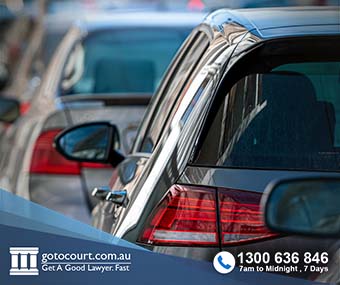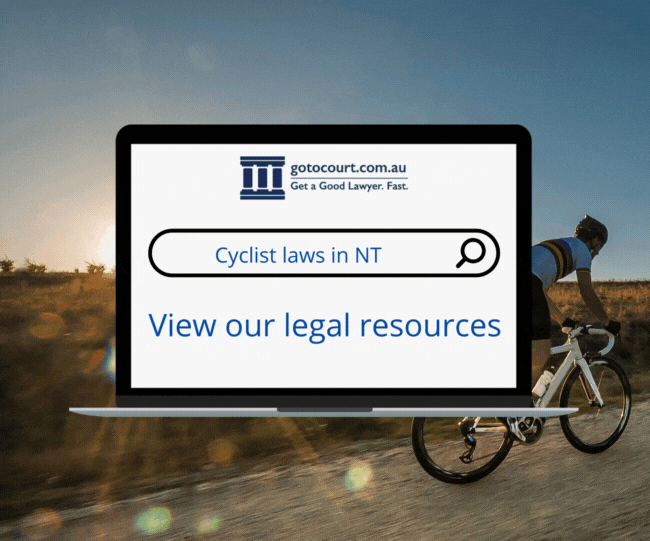Cyclist Laws (ACT)
Cyclist Laws (ACT)
In the Australian Capital Territory (ACT), cyclists must follow the rules within the Road Transport (Road Rules) Regulation 2017. Cyclists are subject to the same rules and regulations as any other road user, and they can face fines, licence disqualifications and even prison terms if they breach the road rules. This page looks at cyclist laws in the ACT.
Cyclists on ACT Road
When a road in the ACT has a dedicated bike lane, a cyclist must remain in that lane unless there is an obstruction or hazard. A cyclist can also legally ride on footpaths if they keep to the left and give way to pedestrians. Cyclists can ride at low speeds (10km/h or less) across pedestrian crossings, keeping left and giving way to pedestrians.
When a cyclist is riding amongst cars, the cyclist is considered a “vulnerable” road user as they do not have the same protection as motorists in the event of an accident. As a result, motorists are required to take care around cyclists, keeping a safe distance and giving way when necessary. The Share the Road initiative promotes positive attitudes towards vulnerable road users and is designed to reduce the number of injuries and fatalities on ACT roads. One of the Road Rules that is intended to address this risk is the rule that relates to overtaking. Motorists must provide a minimum one-metre distance when overtaking a cyclist in 60km/h speed zones and one and a half metres in faster speed zones. A cyclist can overtake a motorist on the left at any time unless the vehicle has a left indicator on and is turning left themselves.
Cyclist Rules
Cyclists are legally permitted to ride side-by-side in the ACT (two abreast) on both regular roads and dedicated bike lanes. When riding in this fashion, the cyclists must be less than 1.5 metres apart and act courteously and with consideration for other road users.
A cyclist in the ACT is expected to obey the Road Rules, such as stopping at traffic lights and stop signs. Additionally, a cyclist must:
- Regularly check the cycle’s tyres and brakes are in good condition;
- Keep to the left of a shared path or footpath unless impractical, giving way to pedestrians;
- Act predictably and signal intentions to other road users before turning or changing direction; and
- Anticipate other road users’ actions.
On occasion, road signage may allow different rules for cyclists and motorists on ACT roads. For instance, a cyclist can cross an intersection if a bicycle crossing light is green, even if the traffic lights are yellow or red.
Cyclist Distractions
Cyclists must have full control of their bikes and be constantly vigilant to road conditions. When riding, cyclists can only legally use a phone for calls, music or navigation if the phone is in the rider’s pocket or properly attached to the bike. It is illegal for cyclists to use a mobile phone to text (including audio texting), email, video message, access social media, use other phone applications or take photographs. A cyclist can be fined if they unlawfully use a phone while riding.
Cyclist Safety Rules
A cyclist must install and use a bike bell to warn other road users. When cycling after dark, a rider in the ACT must have lights that are visible for at least 200 metres and display a rear red reflector that is visible for at least 50 metres. A cyclist in the ACT is required to wear bright clothing to improve rider visibility. There is strict enforcement of the road rule that requires cyclists to wear an approved and securely fastened safety helmet. Recently, the ACT introduced a religious exemption to the mandatory helmet laws for cyclists. For instance, a Sikh wearing a turban would find it difficult to secure a helmet. Under the regulation, a cyclist is not required to wear a helmet if they are a member of a religious group and are wearing a headdress customarily worn by members of the group, which makes it impractical to wear a bicycle helmet.
Cyclist Penalties
The Road Rules contains a number of penalties that target non-compliant cyclists. A cyclist who does not follow the Road Rules can be issued with an official Caution or a Traffic Infringement Notice (TIN). Cautions and TINs are typically issued to cyclists for:
- Failing to wear a helmet;
- Carrying a passenger who fails to wear a helmet; or
- Riding a bicycle that is not equipped with proper safety equipment such as a warning device and front and rear lights.
Cycling While Intoxicated
While cyclists are not subject to motor vehicle drink driving laws, it is a criminal offence for a cyclist to ride a bike while under the influence of drugs or alcohol. Under the Road Transport (Alcohol and Drugs) Act 1977, it is prohibited to ride on a road while under the influence of alcohol. If a cyclist is caught riding under the influence, they face fines and possibly even imprisonment. A repeat drink driving offender with a high reading faces a maximum 5-year license disqualification, a fine of several thousand dollars and a year’s imprisonment. A 19-year-old man was recently prosecuted for drink riding in Canberra after he was caught and charged while cycling drunk at 3 am. Although he claimed that he was unaware that his behaviour was unlawful, he was convicted and fined $400. Of note, the cyclist was also banned from driving a motor vehicle for a period of six months. In his judgment, the Magistrate found that the cyclist represented a danger to the public.
Go To Court Lawyers can provide legal advice for any questions you have about cyclist laws in the Australian Capital Territory. Please get in touch with our experienced traffic law solicitors on 1300 636 846 for any legal assistance.

Affordable Lawyers
Our Go To Court Lawyers will assist you in all areas of law. We specialise in providing legal advice urgently – at the time when you need it most. If you need a lawyer right now, today, we can help you – no matter where you are in Australia.How It Works




1. You speak directly to a lawyer
When you call the Go To Court Legal Hotline, you will be connected directly to a lawyer, every time.

2. Get your legal situation assessed
We determine the best way forward in your legal matter, free of charge. If you want to go ahead and book a face-to-face appointment, we will connect you with a specialist in your local area.

3. We arrange everything as needed
If you want to go ahead and book a fact-to-face appointment, we will connect you with a specialist in your local area no matter where you are and even at very short notice.










